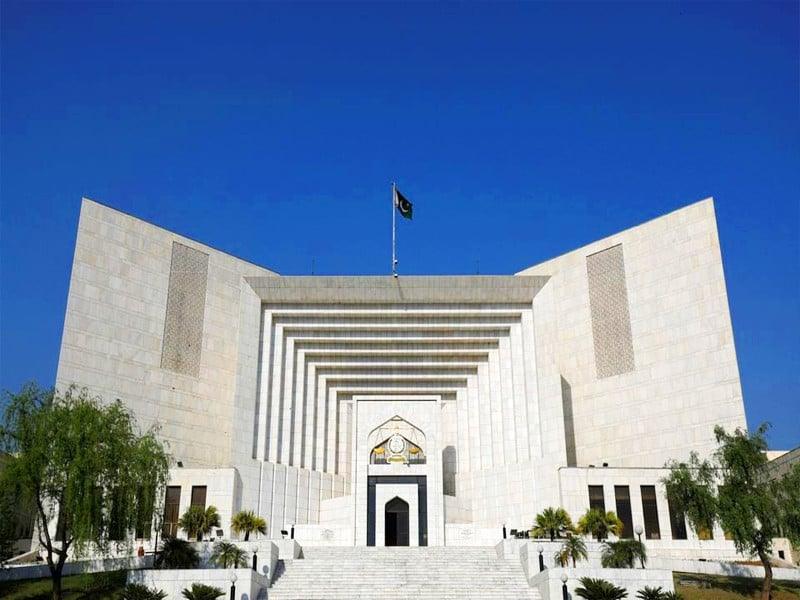The Supreme Court’s constitutional bench resumed its consultation on the appeals against the trial against civilians in military courts, with Justice Musarat Hilali questioning the difference between the ApS attack in 2014 and the protests on May 9.
The seven-member bench, led by Justice Ameenuddin Khan, heard arguments from Khawaja Ahmad Hussain, the lawyer who represented Justice (R) Jawad S. Khawaja, reported Express News.
During the case, Hussain claimed that “ordinary civilians do not fall under the Army Act applicable to Pakistan’s military staff and civilian employees of the armed forces.”
Bench investigating justice in military attempts
Justice Hassan Azhar Rizvi asked if the Army Act applies to Airbases attacks. Justice Hilali added, “The ApS attack was an act of terror, while May 9 was a protest. What separates the civilians involved?”
Khawaja Hussain explained that the ApS attack led to the 21st constitutional change, enabling military trials with those responsible for terrorism.
“9. May of May must be tried, but not by military courts, ”he argued. Justice Aminuddin Khan acknowledged that the Court has the authority to review any legislation that contradicts the Constitution.
Justice Musarrat Hilali noted, “All children who were killed in the ApS attack were civilians.”
“Can a victim be a fair judge?” Lawyer challenges military attempts
During the procedure, Khawaja Ahmad Hussain referred to the 9th declaration of the ISPR, the media wing of the Pakistani army. He said, “ISPR released a statement on May 15 about the events of May 9. Do you have objections to the statement?”
The lawyer replied, “I have no objection to the first part of the statement. , how can it secure justice?
Justice Musarrat Hilali noted that the lawyer’s arguments relate to the benefits of the case, while Justice Aminuddin Khan advised the lawyer to limit his arguments to legal affairs.
The lawyer maintained, “a victim cannot carry out an impartial trial.”
“Where should future foreign spies be tried?” The court asks
Justice Hassan Azhar Rizvi asked, “If a foreign spy is trapped in the future, where will their trial be implemented?”
The lawyer replied, “Such cases must be handled by courts against terrorism.”
Justice Rizvi smiled and noticed, “Oh really?”
Justice Aminuddin Khan pointed out an inconsistency in the arguments and said, “It’s strange to declare a law that is invalid while he also said there should still be special remedies.”
Justice Muhammad Ali Mazhar asked: “Can Pakistan’s armed forces use section 2 (1) (d) (2) in the law of the Army in the future?”
The lawyer replied, “The reality is that this section in the future cannot be used. I would like to continue with my arguments.”
Comparison with KulbhusHan Jadhav -Case
The discussion also touched on the Indian spy Kulbhushan Jadhav, with justice Muhammad Ali Mazhar, who questioned how striking down section 2 (2). 1 (d) (ii), of the Army Act could affect future espionage cases.
“If we invalidate this provision, where would trial of foreign spies be conducted?” Justice Rizvi asked. Hussain replied that such cases could be tried in courts against terrorism. Justice Rizvi, smiling, replied, “Okay then.”
Justice Aminuddin found that it was contradictory that the petries were trying to shut down the Army Act provision while also advocating special exceptions.
Concerns over military legal procedures
Hussain claimed that Field General Court Martial (FGCM) attempts do not allow accused individuals to choose their legal representation and said, “In FGCM, a lawyer is appointed with the army’s approval only.”
Justice Hilali asked if the lawyer presented arguments to the defendants who were not in court.
Justice Mandokhail also referred to previous decisions and noted that the FB Ali case maintained the key provisions of the Army Act and that the 21st constitutional amendment was decided by a full bench of 17 judges.
The bench later stood on the consultation until Monday, February 3rd.



